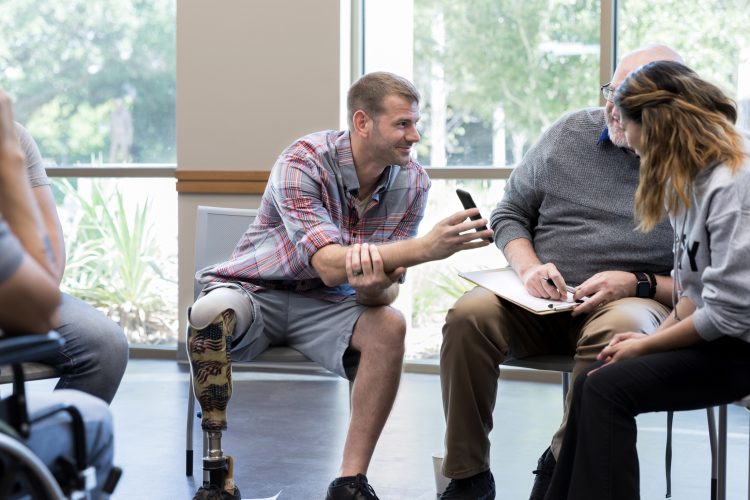Speaking to another amputee can make a real difference to your recovery and ease your concerns. We call this type of assistance Peer Support.
Following surgery, you will need time to recover. It is also a time to set goals about your journey ahead. Here, we help to guide you through the process to navigate your pathways forward.
Effectively managing your short and long term health will lead to better outcomes and prevent future problems.
Getting the right kind of prosthesis to suit your lifestyle needs and daily level of activity is important.
People are often concerned about the costs involved in getting a prosthesis. In Australia, there are a number of different funding schemes and it can be easy to get confused and to know what you are eligible for.
Limb loss can affect people in a variety of ways. Apart from the physical impact on your body and changes that amputees need to make; the mental and emotional challenges of limb loss can be hard to get used to.
This information sheet explores the issue of mental health, why it’s important to make your mental health a priority in the same way you do your physical health.
Mental health includes our emotional, psychological and social wellbeing. It affects many areas of our lives – how we think, feel, behave and act. It can determine how we cope with stress, connect with others, make choices, and take part in our community. When someone experiences a traumatic event or suddenly acquires a disability, such as an amputation, it is not unusual for a person’s mental health and wellbeing to be affected. This is normal, but the sooner you can find ways of finding the support your need the better your outcome is likely to be.
The loss of a limb/s can be shocking, after all it is a life changing event. Amputation can impact your mobility, independence, relationships, the way you connect with others, your job and your plans for the future. These are normal concerns, particularly in the early stages immediately following amputation. It is also normal to feel sad, frustrated, anxious, alone and worried. In other words, it’s not unusual to feel like more than just your physical health has been challenged but your mental health as well.
Studies have found that after an amputation people can experience depression, and anxiety can be as high as 41 per cent. For this reason it is important to take steps to manage any symptoms of depression and anxiety that you may be feeling. If you leave your mental health untreated it can negatively impact your recovery and rehabilitation, as well as your physical health.
Researchers have found eight common stages that people may go through when coming to terms with physical disability.
Not everyone experiences each of these stages, they may only experience some of them, and not necessarily in any particular order. Working your way through a grief process is personal. Some people can get feel stuck in some stages, while others move back and forth during their recovery.
Amputees can experience a range of daily challenges - pain, discomfort, fatigue, lack of mobility, feeling alone and emotional distress to name a few. Sometimes, quite naturally we focus on our physical health and forget about how important our mental health and wellbeing is.
Making time in your life to think about your mental health and wellbeing, and engaging in self care, is a great way to manage the ongoing challenges that can come with life as an amputee. There is a great deal of support out there if you feel that your mental health is being affected:

"One in seven Australians will experience depression in their lifetime.”
Black Dog Institute
Limbs 4 Life can arrange for you to speak with one of our trained Peer Support Volunteers or join a Peer Support Group. A peer is a person who is also an amputee and available to offer practical, social and emotional support because ‘they’ve been there too’. You may also want to join Limbs 4 Life’s online support group, where you can connect with other amputees.
“One in five Australians has a mental illness or disorder.”
Department of Health and Human Services

If you are still recovering in hospital or rehabilitation let the staff know that you need some mental health support, and they can arrange for you to speak with a professional.
Your doctor can assist you with a ‘mental health care plan’ and refer you to a psychologist or counsellor. These visits can be subsidised via Medicare or sometimes through private health insurance companies. If you are a National Disability Insurance Scheme (NDIS) participant, you can add access to mental health support to your plan.Consider contacting a mental health service to get immediate assistance and support. The main services include:
Lifeline
Call 13 11 14 or visit www.lifeline.org.au
Beyond Blue
Call 1300 22 4636 or visit www.beyondblue.org.au
Headspace (younger amputees)
Visit www.headspace.org.au to find your nearest headspace centre or join the online support service
Sane Australia
Call 1800 18 7263 or visit www.sane.org
Open Arms (veterans and families)
Call 1800 011 046 or visit www.openarms.gov.au
Learn more about about coping with grief and loss.
Read this article as a PDF
Keep up to date with our latest news, events and information
